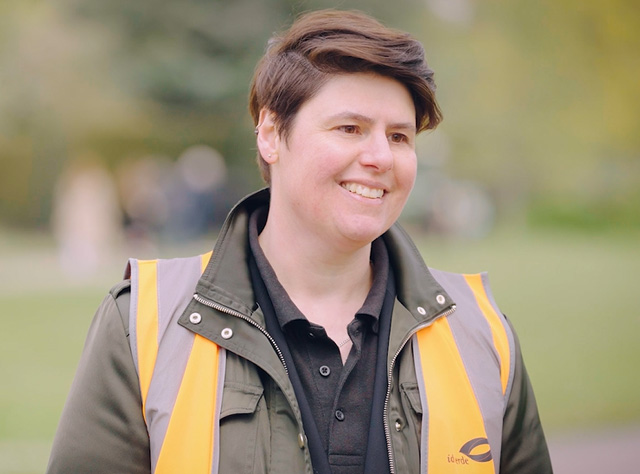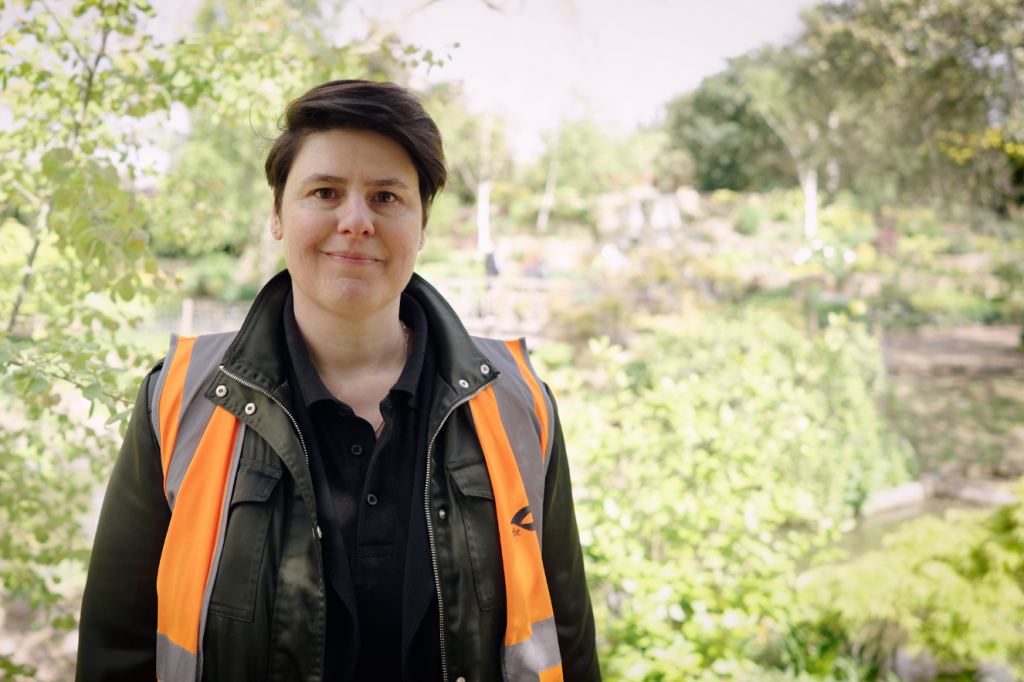Lucy's Story: Mentoring Helped Shape My Own Journey!
When Lucy Fisher, Operations Director of idVerde, contacted us to tell us about her new talk focused on mentoring in green space jobs and horticulture, we thought this would be a great opportunity to help her in her promotions, and also interview her as part of our ongoing Women in Horticulture series.

As IdVerde’s Operations Director, Lucy is the intersection between commercial strategy and sustainability. Managing diverse teams and their needs with efficiency and adaptability, she has built a portfolio of valuable technical skills within the sector, but she believes that the soft skills are just as important. And that is more important than ever. Lucy explains;
Getting soft skills right — particularly emotional intelligence and quality communication — is what help people to perform at their best. This is more important than ever in the green space sector, where keeping the team motivated and energised is essential as the industry continues to evolve’
Lucy’s love for working with green spaces began in her childhood.
“Mum had our family garden re-landscaped, and I remember constantly pestering the landscape gardener to let me help. He showed me how to use a pneumatic drill, how to plant, and even how to install the pond. Looking back, it felt like my very first work experience. That was the moment I realised I didn’t want to work in a traditional office — I wanted to be outdoors’
Following a Royal Parks Apprenticeship at Regents Park Lucy received her horticultural qualifications and worked her way up in management.
After working within the industry for over 25 years, Lucy has identified a need for greater diversity and accessibility within the workforce. She aims to help encourage others to seek mentoring and academic training to help them build on their careers and potential to help climate solutions.
“In response to climate change, there’s a shortage of skills. We need people with different experience and unique perspectives.”

What are the benefits of working in the green space sector?
The industry is incredibly accessible, with low barriers to entry and lots of “on the job” opportunities to gain experience and work your way up. However, Lucy emphasises that there are also roles available in the middle ground to those with alternative experience, in operations, strategy and middle management. She tells us that “no one has to fit in a box and there’s space for those interested in working in the sector to carve out their own niche.” This is incredibly encouraging, and there are multiple pathways to enter from.
“For example, I went on a side shoot with sustainability: I was able to explore that. The sector has a huge role to play in the biodiversity crises that isn’t being talked about enough. Our industry can help solve that. Even dense urban areas – there’s a huge role that city planning and design plays in the future.”
It seems that anyone with a skill or experience combined with a passion for purposeful impact can be part of the green space sector.
Lucy’s latest focus has shifted to mentoring, and in 2025 showcased her latest talk “From Gardens to Growth: A Journey Into Mentorship and Opportunity.” It’s a talk about the power of mentorship in career development and personal growth.
“In this talk, I explore how both formal and informal mentoring shape my own journey, and I share real examples from my team to show how the right support and honest feedback—at the right time—can unlock potential and build confidence.”
Given her experience, Lucy is in a great position to inspire the mentorship of others, and encourage women in particular, to enter the sector for a career with potential and purpose.
What are the pitfalls?
Broadly – historically – the sector has been overlooked as a career of choice for many. The emphasis on manual skills and working outside has led to a misconception of the workforce and career appeal being ‘unsuitable’ for many who have a passion for gardening, nature or the outdoors. Lucy believes that there is a craft to working in this sector, whether that’s in horticulture, park management, grounds maintenance and landscape design, etc, that hasn’t been accounted for. She wishes to see more respect for its workforce, and this requires leadership.
“We are seeing a shift, but much more still needs to be done for the sector and its workforce to gain the respect they deserve” she explains.
What support is out there?
In her early years at Idverde, Lucy felt well supported. This gave her the space to focus on her own development and, over time, her goals began to change. She became eager to continue broadening her knowledge and experience.
After spending some time in contract management, however, Lucy came to a difficult realisation.
“I wasn’t as good as I thought I was,” she admits. “I lacked an academic background, and this was holding me back. What I needed was very different from a vocational qualification.”
With the support of her employer, Idverde, Lucy enrolled on an MBA at Henley Business School to strengthen her business knowledge as well as her confidence, resilience, and self-awareness. She then completed an MSc in Sustainability at Cranfield University and is now pursuing an MSt in Sustainability Leadership in the Built Environment at the University of Cambridge.
Lucy reflects that the past five years have brought the most growth in both her professional and personal life — built on resilience, commitment, and passion, and shaped by her journey to becoming a more adaptable and effective leader. Through her studies, she has also discovered that multidisciplinary urban greening — and biodiversity, which is often overlooked — is vital to driving meaningful change.
With her true graft and hard work, Lucy gained the knowledge she needed to move forward, and thrive. However, Lucy believes it was more than her academic qualifications that got her to where she is now.
“I surrounded myself with the people that I wanted to be. I felt inspired! And this network helped me gain confidence in myself.”
And, it wasn’t just the course that developed Lucy’s professional wisdom; it was the academic experience of working with like-minded peers, and for meaningful change.
“Academic rigour really becomes essential, for the technical skills you gain, but also for the confidence it gives you; to articulate yourself clearly, to ask good questions, and hold your own in a room full of people.”
Lucy also highlights the influence of her own mentor, Richard Burton, who consistently encouraged her to aim higher. She believes his support demonstrates how good mentorship can drive success — and inspire others in turn. “It’s important to work somewhere that supports and nurtures you,” Lucy says.
What is the next step for you in Green Space:
Lucy’s been sharing her mentoring talk across London. The talk addresses the three stages of the mentoring process;
1 – Pre-mentoring – supporting those who are not quite work-ready.
2 – Traditional mentoring – passing on knowledge from one professional to another, with feedback and guidance at the core.
3 – Expert/critical feedback – giving honest and constructive critique, creating a positive space where critique helps mentees grow in confidence and capability.
The goal is to build psychological safety by the third stage — developing a trusted relationship that allows for open conversation, problem-solving, and real growth.
Lucy will also be committing time to “more horty” ventures… and hopefully joining us for future events! #watchthisspace
Qualifications:
Currently studying Mst in Sustainability Leadership in the Build Environment – Cambridge University
MBA at Henley Business School
MSc in Sustainability Cranfield University
Royal Parks Apprenticeship at Regents Park
NVQ 3 in Decorative Horticulture
NVQ 3 in Sports Turf
RHS General Certificate
Planting Design
NEBOSH General Certificate
Lucy still attends trade shows to connect with new people in her network as part of her continued personal growth
What advice would you give someone looking for a job in the sector?
- Don’t settle for what people tell you should settle for – a common path is not the only one, you can carve your own path!!
- Surround yourself with people you aspire to be like, and then put in the work to reach their level
- Build a strong network so you always have someone to turn to for specific problems or expertise — you don’t have to do it all on your own
- Personal development is often uncomfortable; if you don’t feel stretched, you’re unlikely to be progressing.
- Put the work in!
What do you love most about your job?
“It is great working at idverde.” Being part of idverde has given Lucy the chance to contribute to unique projects and events — from providing services for the Queen’s funeral to the King’s birthday celebrations and Trooping the Colour. The diversity of the work and the projects the company takes on is remarkable.
“Because of the spaces we work in, there are so many opportunities to be involved in once-in-a-generation events.”
Above all, Lucy believes that the support she has received from her employer has made all the difference. She values the autonomy and trust, she has been given — something she feels is a result of the effort she has put into developing herself both professionally and personally. For instance, Lucy never imagined she would become a public speaker, but she now regularly talks about sustainability and how to make meaningful progress.
“The personal development side is often underestimated. It requires leadership and resilience, but blending personal growth with professional development can create incredible opportunities.”
Are you thinking about moving to the green space sector?
The Green Space Skills Hub can help you in your journey! Contact us or check out our jobs board for the latest vacancies!